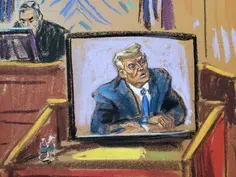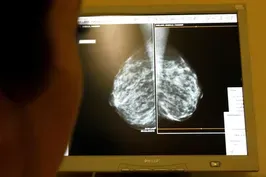
Biden meets with Republicans ahead of debt ceiling deadline
Clip: 5/9/2023 | 8m 10sVideo has Closed Captions
Biden meets with Republicans as U.S. runs up against debt ceiling deadline
The full faith and credit of the United States is on the line as President Biden meets with Congressional leaders in an attempt to avoid an unprecedented default. Republicans demand cuts in exchange for lifting the debt ceiling while Democrats maintain any discussion of future spending must be divorced from paying prior debts. Laura Barrón-López and Lisa Desjardins report.
Problems with Closed Captions? Closed Captioning Feedback
Problems with Closed Captions? Closed Captioning Feedback
Major corporate funding for the PBS News Hour is provided by BDO, BNSF, Consumer Cellular, American Cruise Lines, and Raymond James. Funding for the PBS NewsHour Weekend is provided by...

Biden meets with Republicans ahead of debt ceiling deadline
Clip: 5/9/2023 | 8m 10sVideo has Closed Captions
The full faith and credit of the United States is on the line as President Biden meets with Congressional leaders in an attempt to avoid an unprecedented default. Republicans demand cuts in exchange for lifting the debt ceiling while Democrats maintain any discussion of future spending must be divorced from paying prior debts. Laura Barrón-López and Lisa Desjardins report.
Problems with Closed Captions? Closed Captioning Feedback
How to Watch PBS News Hour
PBS News Hour is available to stream on pbs.org and the free PBS App, available on iPhone, Apple TV, Android TV, Android smartphones, Amazon Fire TV, Amazon Fire Tablet, Roku, Samsung Smart TV, and Vizio.
Providing Support for PBS.org
Learn Moreabout PBS online sponsorshipGEOFF BENNETT: The full faith and credit of the U.S. is on the line as President Biden met today with congressional leaders in an effort to avoid an unprecedented default.
The U.S. may be unable to pay its bills come June if both sides can't arrive at a deal to raise the debt limit.
Republicans are demanding fiscal reforms in exchange for raising the debt ceiling, while Democrats maintain that any discussion of future spending must be separate from paying for prior debts.
Here's what both sides had to say following the meeting.
REP. KEVIN MCCARTHY (R-CA): The House has raised the debt ceiling in a responsible manner, curve our spending at the same time, bring us economic growth.
And I asked the president this simple question: Does he not believe there's any place we could find savings?
SEN. CHUCK SCHUMER (D-NY): The disagreements are wide.
And anyone who says, my way or no way, and we're going to default, is not serving the country well.
And I'm afraid that's what Speaker McCarthy is saying.
GEOFF BENNETT: Laura Barron-Lopez is at the White House.
And Lisa Desjardins joins us from Capitol Hill to take us behind the scenes of these tense negotiations.
So, Laura, we will start with you.
It still sounds like a stalemate.
What's the word from the White House after this meeting wrapped?
LAURA BARRON-LOPEZ: There's been very little movement, Geoff.
So, right after the meeting ended, Democratic leaders and Republican leaders came out and they said that they agreed with the White House that their staff would start talking as early as this evening, if not tomorrow, would continue talks around the budget and appropriations process.
But when it comes to the debt limit, and how exactly they're going to move forward on that, there's been little change.
The White House position is still this.
It's that they want a clean debt ceiling increase first.
They say that the country needs to avoid a default and economic disaster and that they are open to separate budget talks, but they are no on a short-term extension.
Now, Speaker McCarthy did add that the principals, the big four themselves, congressional leaders, as well as President Biden, are likely to meet this coming Friday.
But the White House has not officially confirmed that, Geoff.
GEOFF BENNETT: Lisa, the Senate Republican leader, Mitch McConnell, speaking to reporters after this meeting, said, look, elections have consequences and that this White House has no choice but to do a deal with the Republican House speaker.
Give us a sense of what else Republicans had to say.
LISA DESJARDINS: That's right.
Well, the House speaker was his confident self.
You can always tell when Kevin McCarthy is confident because he takes a lot of questions.
In fact, he spent nearly half as much time talking to reporters as he did inside the meeting with the White House.
The line from Republicans that they're going to use again and again is that the House has in fact passed an extension of the debt ceiling.
Of course, that's part of the package of spending cuts that the Biden administration completely refuses to sign on to and which they think is dangerous.
But McCarthy will say, hey, can the Senate even pass a debt ceiling increase?
That's the question at their feet.
Meanwhile, to the points that Laura raised from the White House, this is how Republicans answer what they want exactly to go on.
They say they do not want any clean debt ceiling increase, a stark contrast there, that they instead believe that, in addition to default, long-term debt is a crisis that they believe Democrats aren't paying enough attention to.
They would like, in fact, they insist that budget talks be part of the negotiation, complete opposite of the White House.
One thing that we did learn today the two sides seem to agree on is no short-term deal.
Speaker McCarthy told reporters that today.
That actually is not a great sign, because they are running out of time, as you know.
McCarthy says just two weeks, in his estimation, to try and figure out a framework here.
GEOFF BENNETT: So, Laura, if House Republicans are dug in, and there aren't 60 votes in the Senate to do a clean lift of the debt ceiling, how were Democrats aiming to get there?
What's the plan?
What's the strategy?
LAURA BARRON-LOPEZ: Well, Democrats, as you noted, Geoff, can't really pass a clean debt ceiling increase without Republican votes in the Senate.
And that's why they are repeating over and over again, that in the past, the way this has been done is by a bipartisan vote, that Republicans have joined Democrats in the past in trying to do a clean increase to the debt limit.
Leader -- Majority Leader Schumer today, speaking to reporters, just after the meeting, said this again, saying that, under President -- former President Trump, that Republicans joined -- Democrats joined Republicans -- excuse me -- during those years at least three times to increase the debt limit.
And that was also at a time, Geoff, when Republicans' bills increased deficits by more than $3 trillion under former President Trump, so arguing against this Republican talking point that, essentially, they are concerned about deficit spending.
GEOFF BENNETT: So, Lisa, of the three of us, you are the congressional mathematician, so walk us through the potential math here.
LISA DESJARDINS: I know.
Always fun to try this for TV.
But to kind of talk a little bit more about what Laura was mentioning, let's look at where we are in terms of the needs of getting something to -- into law to raise this debt ceiling.
First of all, as much -- many of our viewers know, let's talk about -- start with the House Republicans.
They have just a four-vote majority there.
So Speaker McCarthy not only needs a deal that President Biden can sign on to, but one that his entire Republican Conference basically can also agree to.
But Democrats see opportunity there.
They wonder if they can't pick off five votes from Republicans to have some kind of compromise at a last minute.
The Senate, as Democrats, with just that one-vote majority right now, as Laura mentioned, the Senate, of course, you need 60 votes for any debt ceiling increase.
Now, there is often more of a bipartisan mood in the Senate, as you say, more of a dinner party atmosphere there.
Not this time.
Senate Republicans are really backing Speaker McCarthy.
Here's a letter that 43 Senate Republicans signed over the weekend.
I want to read to you what they said about this negotiation.
They said that they will not be voting for cloture, meaning they will not be breaking a filibuster on any bill that raises the debt ceiling, without substantive spending cuts and budget reform.
Now, we have been through this before.
Leader McConnell, when he was the leader of the Senate, also said he would not change anything without budget reforms.
He did, in fact end up at having a debt ceiling increase without those reforms.
But every negotiation is different.
And, right now, Republicans in Congress are quite united.
GEOFF BENNETT: Laura, looking at the White House schedule, President Biden is headed to New York tomorrow to deliver a speech on the debt ceiling.
Why New York?
And what's he going to say?
LAURA BARRON-LOPEZ: The president is headed to Hudson Valley, New York, Geoff, where Republican Mike Lawler flipped a Democratic district that the president won in 2020.
Now, that Republican, that House Republican, will be joining President Biden at that event.
I asked the White House press secretary what the president's message would be, and she had this to say.
KARINE JEAN-PIERRE, White House Press Secretary: The president is going to be very clear about what's at stake, the impact of the current discussions that we're having, the impact of this budget and this default that they -- that the House Republicans have connected.
He's going to make it very, very clear this is going to hurt American families.
It's going to hurt our economy, and it's going to hurt American families.
LAURA BARRON-LOPEZ: White House -- White House Press Secretary Karine Jean-Pierre added that the president will be talking about the cuts to veterans' benefits that Republican bill that was passed a few weeks ago would inflict, including some job losses at Veterans Affairs.
GEOFF BENNETT: So, Lisa, what has to happen to break this stalemate at this point?
LISA DESJARDINS: That talking point about Veterans Affairs is deeply pushed back by Republicans here.
But I think, right now, we're watching Wall Street.
It doesn't seem like there's movement by politicians.
Democrats are hoping that maybe Wall Street starts making noises about credit ratings.
That's dangerous for the economy, but something needs to happen to move politicians.
GEOFF BENNETT: More to come.
Lisa Desjardins and Laura Barron-Lopez, on the Hill and at the White House respectively, great to see you both.
Community colleges pay expenses hoping to boost graduation
Video has Closed Captions
Clip: 5/9/2023 | 8m 28s | Community colleges pay student expenses beyond tuition hoping to boost graduation rates (8m 28s)
Investigators reveal Texas gunman's extremist views
Video has Closed Captions
Clip: 5/9/2023 | 5m 39s | Investigators reveal details about Texas outlet mall gunman's extremist views (5m 39s)
Jury finds Trump liable for sexual assault and defamation
Video has Closed Captions
Clip: 5/9/2023 | 8m 15s | Breaking down the verdict as jury finds Trump liable for sexual assault and defamation (8m 15s)
New guidelines recommend mammograms start at 40
Video has Closed Captions
Clip: 5/9/2023 | 5m 50s | New guidelines recommend earlier mammograms amid rise in breast cancer among younger women (5m 50s)
Remembering the 8 people killed in the Texas mall attack
Video has Closed Captions
Clip: 5/9/2023 | 2m 5s | Remembering the 8 people killed in the Texas mall attack (2m 5s)
Rep. Vicente Gonzalez discusses pressure on border towns
Video has Closed Captions
Clip: 5/9/2023 | 6m 10s | Texas Congressman Vicente Gonzalez discusses pressure on border towns as Title 42 ends (6m 10s)
Providing Support for PBS.org
Learn Moreabout PBS online sponsorshipSupport for PBS provided by:
Major corporate funding for the PBS News Hour is provided by BDO, BNSF, Consumer Cellular, American Cruise Lines, and Raymond James. Funding for the PBS NewsHour Weekend is provided by...
















